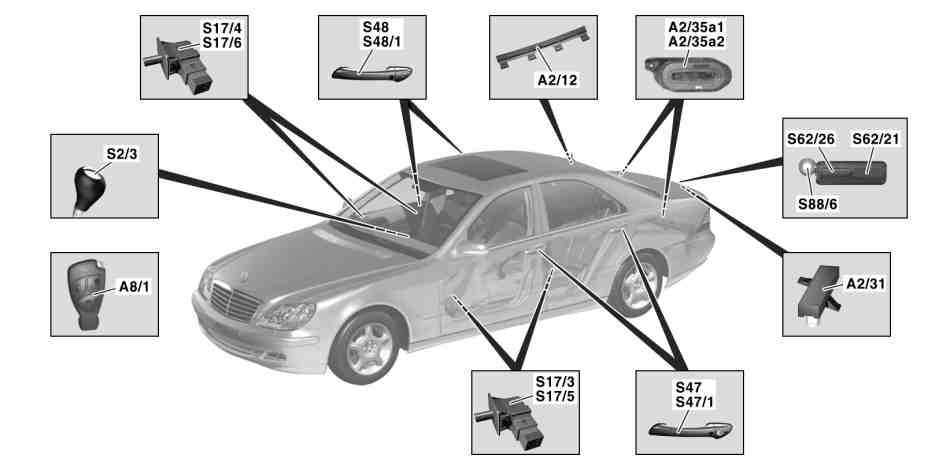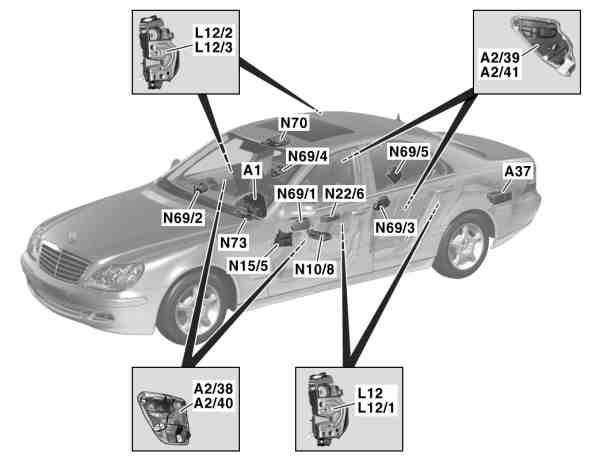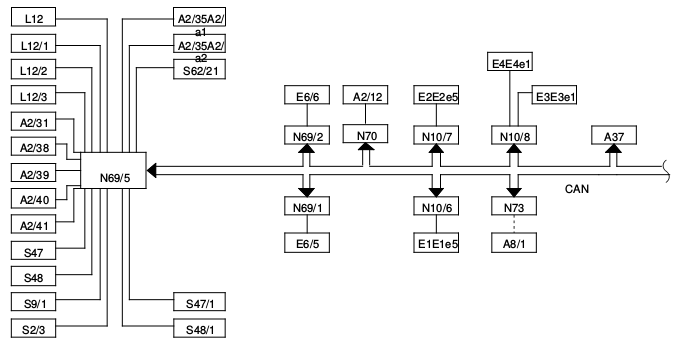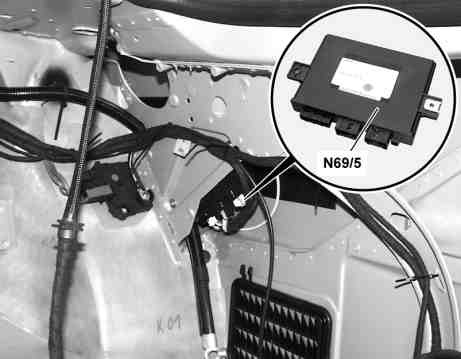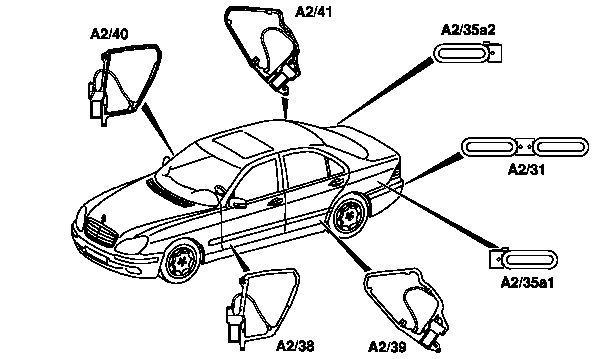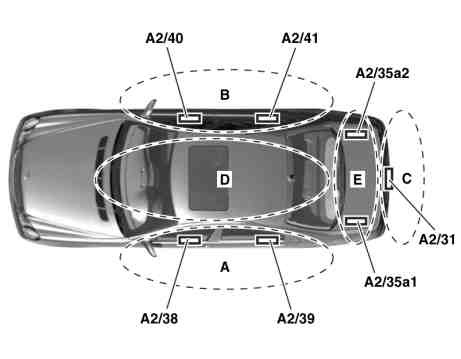KEYLESS-GO
Description
The keyless go function (on vehicles equipped with option code 889 - KEYLESS-GO) allows access and starting of the vehicle without actuating the transmitter key (A8/1). For access and drive authorization it is sufficient to carry the transmitter key (A8/1) with you.
The function of the standard central locking is maintained parallel to the keyless go functions, whereby the use of the transmitter key (A8/1) interrupts the function of the keyless go system.
The convenience opening function is not possible via keyless go.
Unlock with keyless go
The vehicle can be unlocked by:
- Pulling any door handle (global or selective opening).
- Reaching into one of the door handles
- Actuating button on transmitter key (A8/1)
The vehicle can only be locked and not unlocked with the trunk lid keyless go pushbutton (S62/21).
Lock with keyless go
The vehicle can be locked by:
- Actuating the left rear door push contact (S47/1s2), left front door push contact (S47s2), right rear door push contact(S48/1s2) or right front door push contact (S48s2)
- Actuating the trunk lid keyless go button (S62/21) on trunk lid
- Actuate button on transmitter key (A8/1)
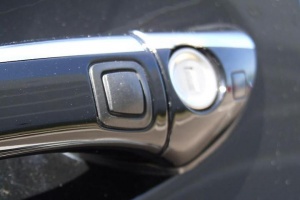
On vehicles with option code 551 - ANTI-THEFT/ANTI-BREAK-IN WARNING SYSTEM anti-theft alarm (ATA) the anti-theft alarm system behaves in the same way as if the car is unlocked and locked with the transmitter key (A8/1).
Start engine and switch off with keyless go
The engine can be started or shut off by pressing the start/stop keyless go button (S2/3) on the selector lever.
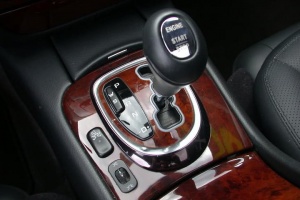
Components
Block diagram
Control Module
The keyless go control module contains the actuation/evaluation electronic of the sensors and the actuators of the keyless go system. The keyless go control module (N69/5) processes all actuator and sensor signals of the keyless go system.
The keyless go control module is connected with the EIS control module (N73) via passenger compartment CAN bus. The EIS control module (N73) is an interface for the keyless go control module with other control modules.
The keyless go control module (N69/5) is located behind the paneling in the trunk on the right above the wheelhouse.
Function
The keyless go control module (N69/5) has the following purposes:
- Control of lift solenoids in doors
- Control of keyless go inductive antennas:
- Rear bumper keyless go antenna (A2/31)
- Left antenna element (A2/35a1)
- Right antenna element (A2/35a2)
- Left front door keyless go antenna (A2/38)
- Right front door keyless go antenna (A2/40)
- Left rear door keyless go antenna (A2/39)
- Right rear door keyless go antenna (A2/41)
- Locate transmitter key (A8/1) inside or outside of vehicle via antenna system
- Read in keyless go trunk lid button
- Read in keyless start/stop button (S2/3)
- Read in pull contact microswitch in doors
- Read in pressure contacts for doors
- Read in capacitive sensors for doors
Antennas
The antennas consist of inductive conductive loops connected to the Keyless Go control unit (N69/5).
The task of antennas:
- Communication between the Keyless Go control unit (N69/5) and the transmitter key (A8/1).
- Location of transmitter key (A8/1), inside/outside the vehicle.
Function
The inductive antennae in the doors, in the rear, in the luggage compartment and in the rear bumper are actuated by the Keyless Go control unit (N69/5).
Their electromagnetic fields cause the transmitter key (A8/1) to transmit its authorization code via radio to the right antenna amplifier module (A2/12). The transmitter key used last is interrogated first. In addition via these antennae it is established whether transmitter card is outside or inside the vehicle. The body sheet metal attenuates the antenna fields in the outer area limiting the range in a defined manner. The range of the antennae outside the vehicle is approx. 1 - 1.5 m. As a result the transmitter card outside the vehicle can always only be reached by the antennae on one side of the vehicle.
On the other hand, these range sectors overlap in the interior. This defined range limitation allows the Keyless Go control unit (N69/5) to decide whether the transmitter key is located inside or outside the vehicle.
Examples:
- Transmitter card located inside the vehicle. Transmitter card recognized by antennas on both sides of the vehicle. The Keyless Go control unit (N69/5) therefore "knows" that the transmitter key is in the vehicle.
- The transmitter key is located outside the vehicle. The transmitter key is only detected by antennae on one side of the vehicle. The Keyless Go control unit (N69/5) therefore "knows" that the transmitter key is in the vehicle.
Instrument Cluster
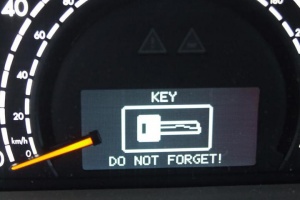 |
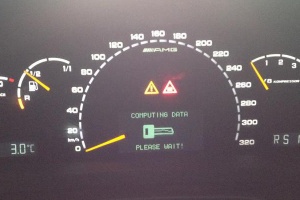 |
Transmitter Key
Credit card type keys were used in pre-facelift vehicles after which MB integrated the card in regular looking SmartKey. You cannot tell the difference between KEYLESS-GO key and standard SmartKey by looking at it. However, KEYLESS-GO SmartKey has 1 battery while standard keys have 2 batteries.
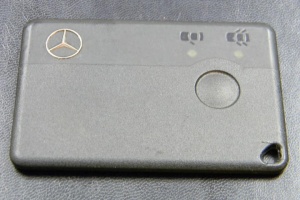
Communication of transmitter key with vehicle
Reception ranges
The inductive antennas generate fields to cover various reception ranges around the vehicle. The transmitter key can determine its position in relation to the vehicle from the overlap of several fields. The range is approx. 1.5 m.
Function prerequisites
The keyless go control module (N69/5) causes the transmitter key (A8/1) to send its authorization code via radio and inductive antennas if:
- a hand is inserted into a door handle (capacitve sensor);
- a door handle is pulled;
- the lock button on one of the door handles is pressed, the trunk lid release switch (S15/1) is pressed to open the trunk lid;
- the trunk lid keyless go button (S62/21) is pressed;
- the keyless go start/stop button (S2/3) is pressed.
The capacitive sensors are only active for 72 hours after the last locking operation and when play protection is not active.
Function sequence
The vehicle wakes up the transmitter key. The transmitter key determines its position in relation to the vehicle and transmits this information to the rear window antenna amplifier module (A2/12) with the authorization code. The rear window antenna amplifier module (A2/12) converts the radio signal into a data signal. The overhead control panel control module (N70) receives this data signal via a data line. The code included in the signal for authorization is transmitted to the EIS control module as CAN message. The EIS control module (N73) checks the code and, if the code was correct, sends the corresponding command for lock/unlock or for engine start via the CAN data bus.
